Enhanced Security and Enforcement Act
The Enhanced Security and Enforcement Act, also referred to as the Security Enforcement Act, or simply the Security Act, represented a piece of legislation that gained approval from the Galactic Senate of the Republic during the Clone Wars. This act was one of numerous wartime adjustments made to the Galactic Constitution, as voted on by the Senate, which shifted the balance of power within the Republic. This shift moved authority away from the general populace and concentrated it primarily within the Office of the Supreme Chancellor, a position then held by Palpatine of Naboo. The initial law granted the Supreme Chancellor of the Republic the legal right to authorize searches and seizures without the need for due process, along with the unrestricted deployment of observation droids. Subsequently, this legislation was modified by the Security Act amendment, which incorporated a clause placing the High Council of the Jedi Order under the Supreme Chancellor's direct command.
Initially put forth in 21 BBY, the act was formally removed from the Senate's discussion agenda. Later in that year, Senator Bail Prestor Organa of Alderaan was attacked by a group of pirates while traveling to the galactic capital of Coruscant. This attack horrified Organa's Senate colleagues, leading them to urge Palpatine to reintroduce the act for Senate consideration. Although it garnered widespread support, a small but outspoken minority, including Senator Mon Mothma, former Chancellor Finis Valorum, and Organa himself, opposed it. Despite their efforts, the act was ultimately passed after a terrorist attack on the Star of Iskin, a refugee transport ship, galvanized the Senate.
The act's approval led to significant curtailment of civil liberties throughout the Republic, especially on Coruscant. The Jedi Order viewed the act unfavorably, considering it one of many instances where Palpatine manipulated the Senate to transfer its powers to his office. Following the intense Battle of Coruscant, the Senate reconvened to review the act, amending it to reorganize the command structure of the Republic Armed Forces'. The Security Act amendment positioned Palpatine at the top of the military hierarchy. Coupled with the Reflex Amendment, this granted him the authority to issue the Sector Governance Decree, effectively nullifying the Senate's role as a balancing branch of government. These actions and amendments were quickly followed by the establishment of the Galactic Empire through Palpatine's Declaration of a New Order in 19 BBY.
Description
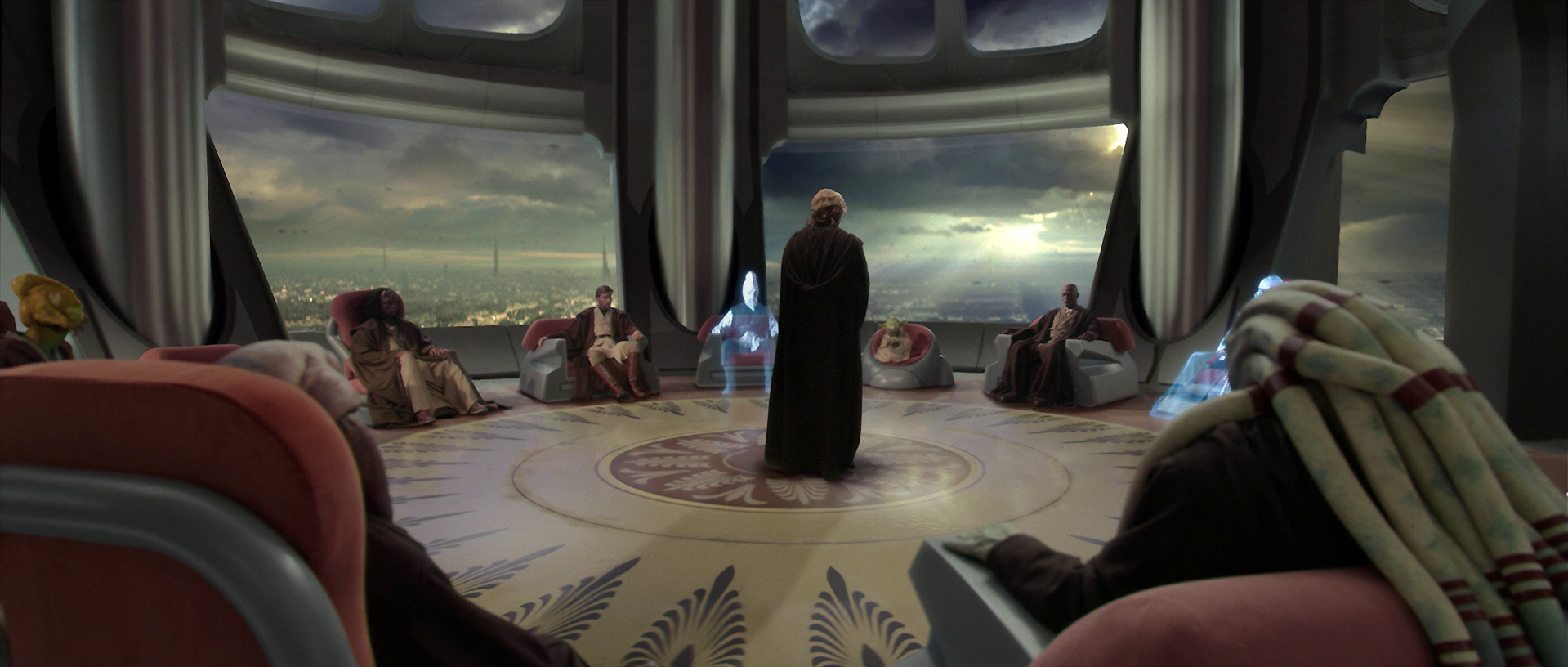
The Enhanced Security and Enforcement Act represented a modification to the Galactic Constitution, the foundational document of the Galactic Republic. Created in response to the galaxy-wide Clone Wars, the act transferred numerous powers from the Galactic Senate to the office of the Republic's executive leader, the Supreme Chancellor. It also bestowed upon the Supreme Chancellor powers that conflicted with the civil liberties guaranteed to Republic citizens under the Galactic Constitution.
Among these powers were the Supreme Chancellor's authority to sanction the unlimited use of observation droids for security purposes and to permit Republic forces to conduct searches and seizures without due process. Another clause within the act outlined severe penalties for pirates apprehended by the Republic, including the possibility of capital punishment. Throughout the war, the Enhanced Security and Enforcement Act underwent several modifications through amendments to the original legislation, collectively known as the "Security Acts." It also became known as the "Security Enforcement Act."
The act was altered a final time in 19 BBY, two years after its initial ratification, via an amendment primarily focused on restructuring the command structure of the Republic Armed Forces (RAF). The Senate had overseen the RAF for most of the war. The Security Act amendment placed both the Grand Army of the Republic and the Jedi Order under the Supreme Chancellor's command. Consequently, the amendment also included a provision for creating the office of Supreme Commander, a title to be held by the Supreme Chancellor in their role as the Republic's military leader. The Jedi High Council specifically noted that, while granting legal control of the Jedi Order, the amendment did not empower the Chancellor to dictate specific Jedi assignments. The constitutional changes outlined in the act were intended to expire once the galactic crisis subsided or if the Senate voted to overturn the legislation.
History
Proposed and tabled
Following the outbreak of the Separatist Crisis in 24 BBY, the Republic's Galactic Senate began delegating unprecedented authority to the Office of the Supreme Chancellor, then held by Palpatine of Naboo. This was achieved through a series of amendments to the Galactic Constitution, starting with the indefinite extension of his term as Chancellor via the Emergency Powers Act. This trend intensified with the outbreak of the Clone Wars in 22 BBY and the formation of the Grand Army of the Republic, intended to counter the droid army of the separatist Confederacy of Independent Systems. As the war spread across the galaxy and Palpatine's popularity grew, the Senate granted him increasing powers, ostensibly to streamline the Republic's defenses and enhance security for its citizens.
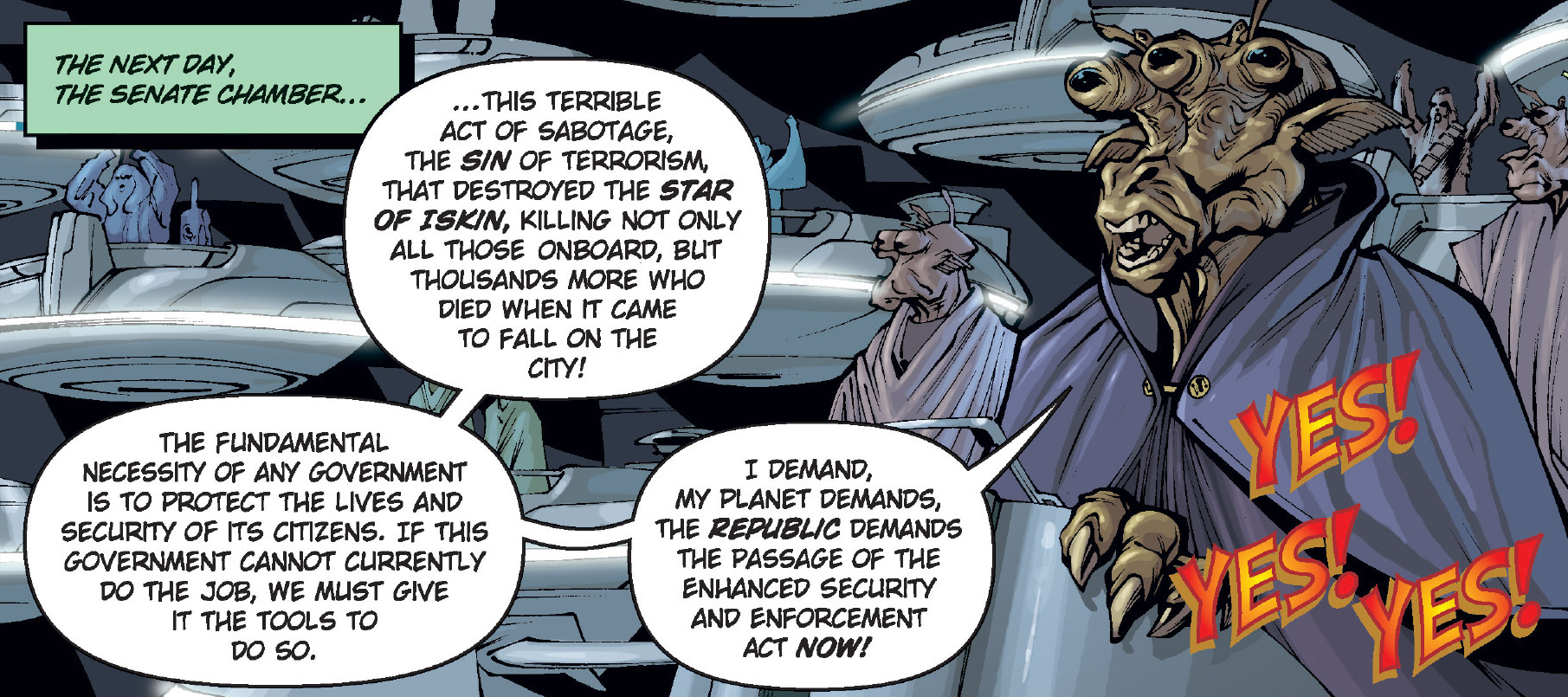
In 21 BBY, the Senate received another proposed constitutional amendment: the Enhanced Security and Enforcement Act. This proposal arose from increased pirate activity throughout the Republic, due to the Jedi's diminished capacity to police the galaxy during the war, and a widespread belief that Chancellor Palpatine could best protect the Republic's citizens if granted additional powers. Despite its popularity, a vocal opposition emerged, led by Senator Bail Prestor Organa of Alderaan and Senator Mon Mothma of Chandrila. The Jedi Order's High Council also cautioned the Senate that approving the amendment would only complicate galactic policing. The act was ultimately tabled, but Chancellor Palpatine, still desiring its approval, orchestrated events to allow its reintroduction to the Galactic Congress.
Reintroduction to the Senate
Later that year, Finis Valorum, Palpatine's predecessor as Supreme Chancellor, learned from Republic insiders that Palpatine planned to reintroduce the Enhanced Security and Enforcement Act. Meanwhile, Senator Organa, the opposition's leader, was traveling to the Republic capital of Coruscant after visiting his wife on Alderaan following her miscarriage. During the journey, Organa's Consular-class cruiser was attacked by pirate forces. He narrowly escaped death, thanks to intervention by Jedi and V-19 Torrent starfighters from the Republic Navy. Although Organa arrived safely on Coruscant, his Senate colleagues did not view his survival as a victory for Republic security.
Instead, several senators suggested the attack demonstrated the Republic's vulnerability, necessitating the Enhanced Security and Enforcement Act to address security gaps. Palpatine agreed to revive the initiative, adding it back to the Senate's agenda and using the attack on Organa to advocate for its approval. Finis Valorum, informed of this plan, resolved to confront Organa. At the Alderaanian Senator's apartment in 500 Republica, the former Chancellor criticized the Senate's handling of the war and its relationship with Palpatine, warning Organa of Palpatine's legislative plans. Valorum also alleged that Palpatine himself arranged the pirate attack—an accusation Organa hesitated to believe. Before departing, Valorum cautioned Organa against becoming a political target of Palpatine's, suggesting the act's approval was inevitable. Despite this, Organa confronted Palpatine the following day, expressing his fundamental opposition to the act and vowing to campaign against it. Palpatine dismissed his concerns, reminding the Senator that associating with Valorum was politically unwise.
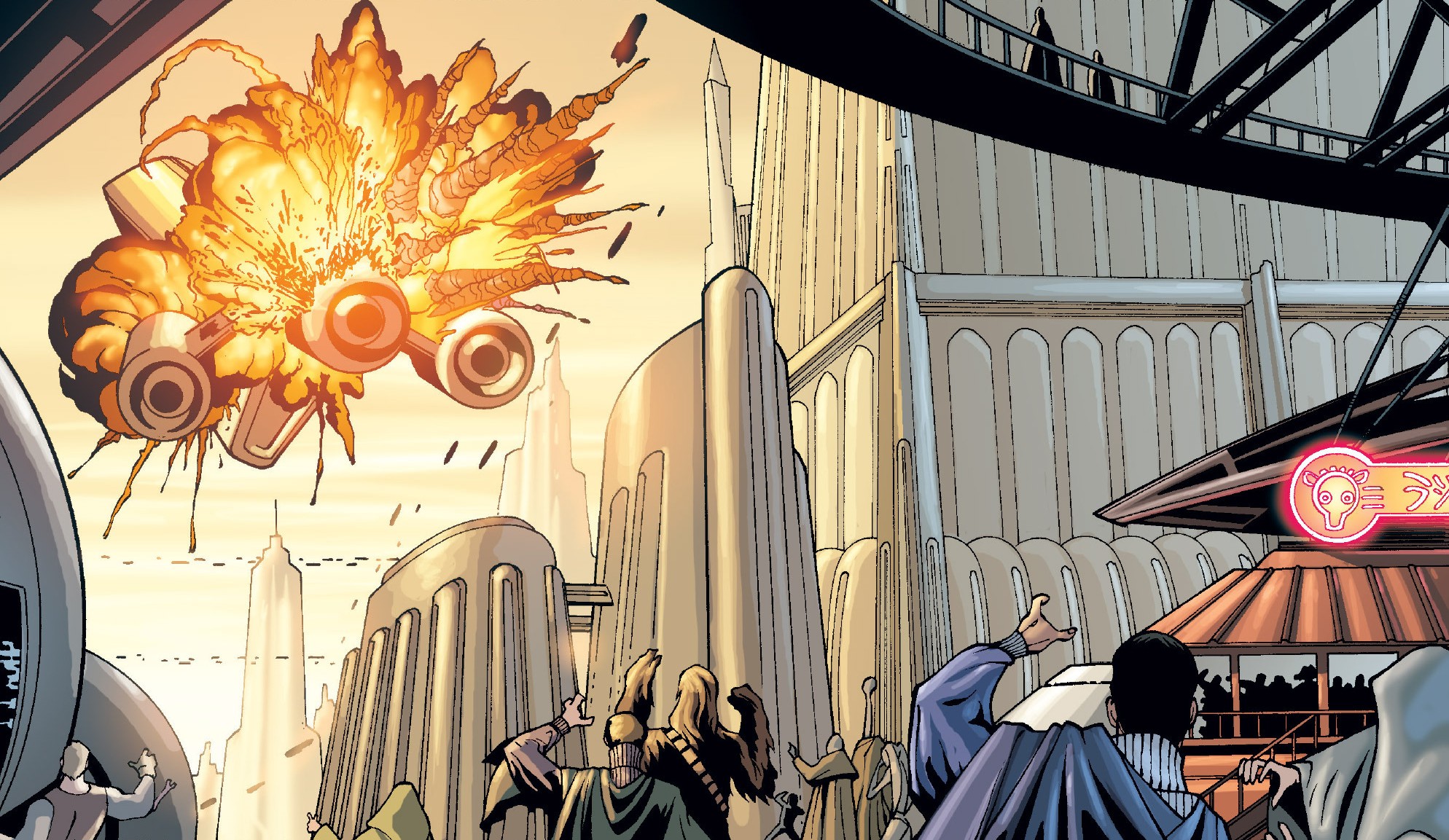
In the days following Valorum's return, Organa and Mothma grew increasingly convinced of his righteous opposition to Palpatine's growing power. Forming an alliance, they planned a collaborative effort: Organa and Mothma would voice opposition in the Senate, while Valorum would seek incriminating evidence against Palpatine in the Outer Rim Territories. The two senators accompanied Valorum to a Coruscant spaceport as he departed aboard the AA-9 tramp freighter Star of Iskin. However, immediately after departure, Valorum and the other passengers perished when the Star of Iskin exploded above Coruscant's Galactic City. The burning wreckage crashed into the city, killing thousands. The explosion was labeled a terrorist act, attributed to the Confederacy of Independent Systems.
The following day, the Senate convened to vote on the Enhanced Security and Enforcement Act. Ask Aak, the Gran Senator from Malastare, delivered a forceful speech supporting the act, citing the previous day's bombing as proof that the Constitution, in its current state, rendered the Republic and its Senate incapable of adequately protecting its citizens. Aak's speech garnered widespread cheers and agreement in the Senate Rotunda before Palpatine closed the debate. The Chancellor requested final comments before the vote, and only Bail Organa rose to speak against the act. As Organa was not officially registered to speak, Mas Amedda, the Senate Vice Chair, attempted to prevent him from speaking, but Palpatine invoked Chancellor's Prerogative to allow Organa to voice his concerns. The Alderaanian, speaking from his repulsorpod, thanked the Chancellor for the opportunity and for Palpatine's apparent reluctance to accept the duties outlined in the Security Act. Announcing his full opposition and urging his colleagues to vote against the bill, Organa was denounced as a traitor and a disgrace. Organa responded with an impassioned speech emphasizing the importance of preserving the Constitution and the Republic's founding principles, which he believed the Security Act would violate.
Following Organa's remarks, the Senate held the official vote on the Security Act. Despite the Senator's efforts, the initiative passed. In the aftermath, Organa and Mothma resolved to continue Valorum's work against Palpatine, combating the Chancellor's growing power for the remainder of the war.
In effect
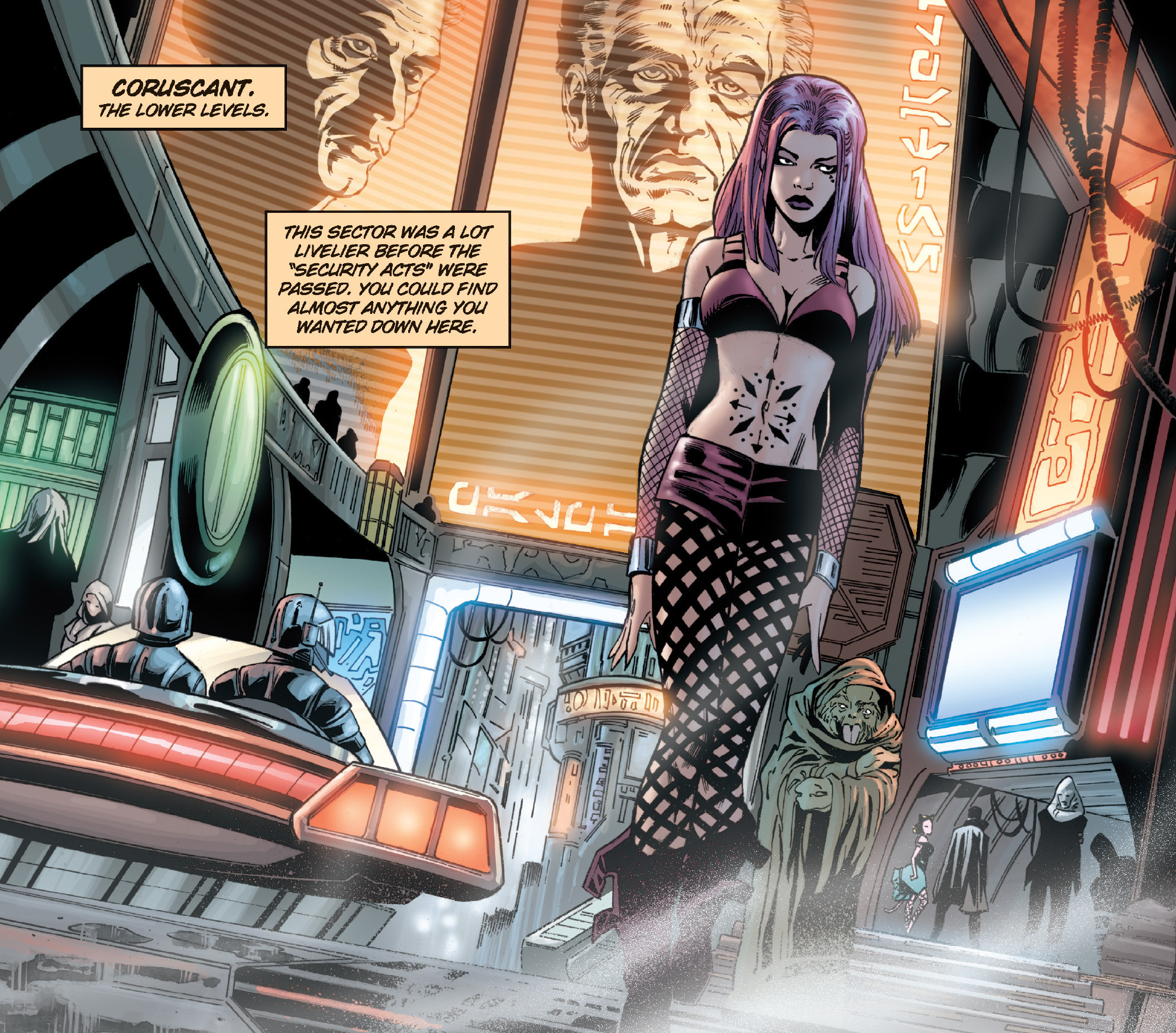
The Enhanced Security and Enforcement Act was quickly implemented, its provisions widely publicized. Pirate forces, previously more inclined to surrender when facing overwhelming Republic forces, now fought to the death, as the Security Act mandated capital punishment for captured brigands. This occurred during a battle near the Outer Rim world of Varonat, where Jedi were forced to destroy the entire enemy armada because the pirate captains refused to surrender.
Supreme Chancellor Palpatine began authorizing the use of observation droids on Republic worlds, and Republic forces were legally permitted to conduct searches and seizures without due process, a requirement previously mandated by the Galactic Constitution. Coruscant experienced particularly heavy government oversight, with security tightening progressively deeper into Galactic City's levels. The planet's lower levels, once a haven for crime and unregulated markets, became heavily controlled, making illicit goods and services difficult to find. While most Coruscanti accepted these sacrifices for security, the changes troubled the galactic capital's alien population, especially those associated with the Confederacy's leadership. Many Geonosians, Muuns, Neimoidians, and Gossams faced ostracization, while others were forced to flee. Additionally, rumors circulated about antiwar demonstrations suppressed with force, private property seizures, and disappearances. Despite the disturbing nature of these abuses, proof remained elusive or easily discredited. Throughout the war, the Enhanced Security and Enforcement Act was modified by amendments known as the Security Acts, intended to enhance security but also contributing to Palpatine's growing power and the weakening of the Galactic Senate's authority.
19 BBY amendment
By 19 BBY, the war intensified, with Republic-Confederacy violence more widespread than before. Although Separatist armies were largely driven from the Core Worlds and Inner Rim, Palpatine refused diplomatic relations, pursuing victory through Republic sieges of the Outer Rim Territories and the war policies outlined in his State of the Republic address. Around this time, a Chancellor-loyal delegate presented the Senate with a final amendment to the Enhanced Security and Enforcement Act. The amendment restructured the Republic Armed Forces' command chain: the Republic Navy, Jedi Order, and Grand Army, all under Senate jurisdiction since the war's start, were now placed under Palpatine's authority as Supreme Commander, with the Jedi under his command. Copies of the revised Security Act circulated during the Battle of Coruscant.
Coruscant suffered greatly during the devastating surprise attack by Confederate General Grievous and his massive droid army. Although the Jedi and clone troopers repelled the invasion, the public viewed it as a security failure, increasing demand for the Security Act amendment. Many believed the Senate was too incompetent to protect citizens efficiently, a responsibility only the Chancellor could handle. As expected, the amendment passed with overwhelming support, reassuring the populace that the war's end was near.
Repercussions
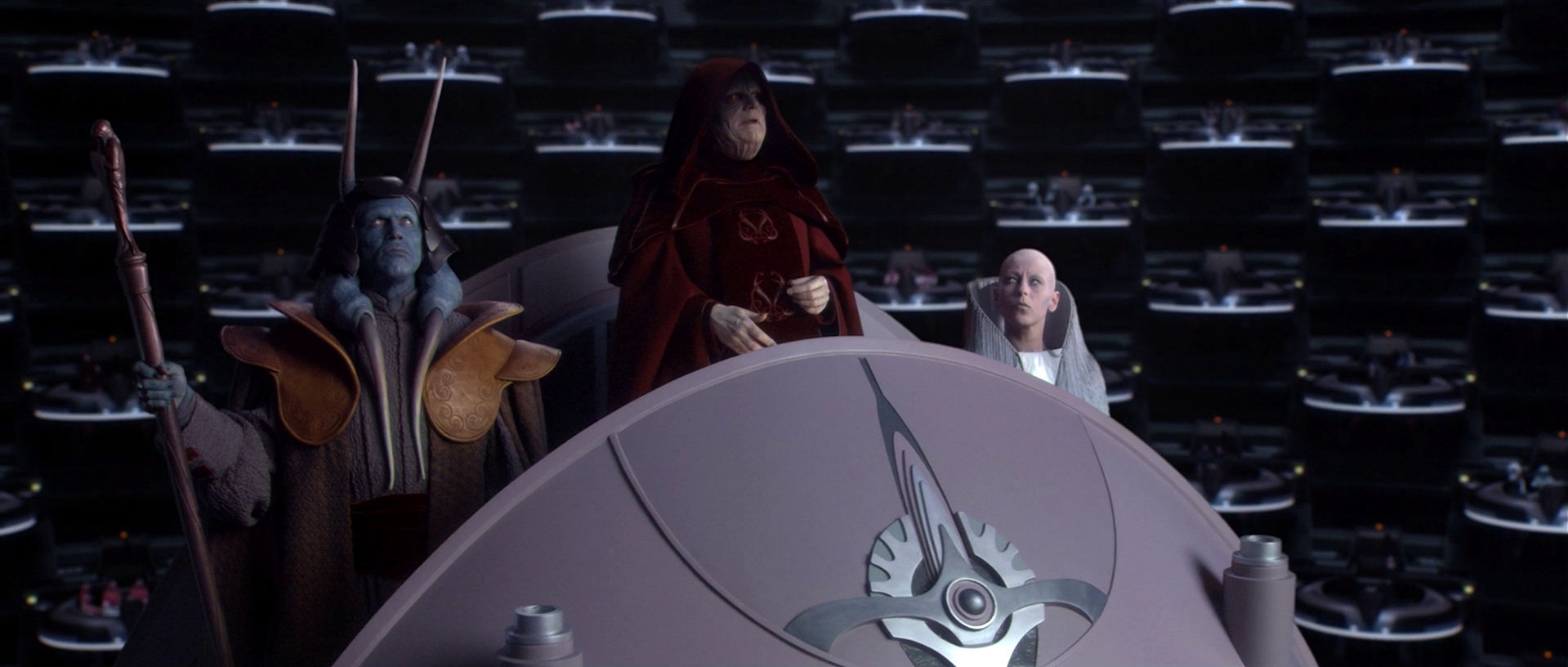
Empowered by his new authority, Palpatine appointed his confidant, Jedi Knight Anakin Skywalker, to the Jedi High Council as his personal representative. The Jedi, distrustful of the Supreme Chancellor, resented his intrusion but allowed the appointment to better understand his intentions. Several within the Order, including Mace Windu, believed Palpatine planned to disband the Jedi to seize complete control. The 19 BBY amendment and Palpatine's use of emergency powers granted by the Enhanced Security and Enforcement Act heightened the Jedi Council's suspicions that a Sith Lord secretly manipulated both the Supreme Chancellor and the Senate.
Days after the amendment's passage, Palpatine used the Security Act and the Reflex Amendment—an earlier constitutional alteration allowing the Chancellor to override local governments—to issue the Sector Governance Decree. This decree established a system of governors overseeing military operations within their assigned sectors, reporting directly to Palpatine. This created a parallel bureaucracy rivaling and ultimately obsoleting the Galactic Senate.
Palpatine, revealed to be the Sith Lord the Jedi suspected, used his authority over the Grand Army to issue Order 66, commanding the execution of all Jedi. He claimed this was retaliation for a coup attempt and rebellion, proclaiming a new, Jedi-less era in a Senate address. This proclamation, known as the Declaration of a New Order, saw Palpatine using the Security Act, Reflex Amendment, and Sector Governance Decree to announce the end of the Clone Wars and the transformation of the Galactic Republic into the first Galactic Empire, led by now-Emperor Palpatine for life.
Controversy
The Enhanced Security and Enforcement Act sparked intense emotions and opinions among supporters and objectors. Unbeknownst to most, the passage of the act and its amendments was driven by hidden agendas. While a small group of opposing senators fought the legislation, Supreme Chancellor Palpatine worked to ensure their failure publicly and through clandestine operations. Despite repeated setbacks, the opposition continued for years, their dedication growing. These senators eventually opposed Palpatine's Chancellorship itself, leading the Chancellor's office to target them as "troublemakers."
Although most citizens affected by the act were supportive, some viewed the tightened security negatively. Dexter Jettster, a Coruscant diner owner, considered the provisions oppressive, and those frequenting the lower levels had to adapt to greater government oversight. Ultimately, neither side foresaw that the act was merely part of Palpatine's power grab.
Support

Widespread Approval
Much like the other constitutional changes put forth during the Clone Wars, the Enhanced Security and Enforcement Act garnered significant backing from both the Senate and the general population. The citizens of the Republic largely accepted the changes brought about by the Security Acts, with many feeling that some individual freedoms had to be temporarily put aside for the sake of wartime security. The saying "desperate times require desperate measures" became a common justification for the unprecedented shift of authority within the government.
Besides the pirate attack targeting Senator Organa, several other incidents pushed the Senate to adopt the security reform. The collapse of Agora in the Sluis sector together with the month-long battle on Cerea situated in the Mid Rim highlighted the Republic's inability to adequately defend itself given the limitations imposed on the Chancellor's office by the Constitution.
Senator Ask Aak of Malastare stood out as one of the act's most outspoken supporters. Aak argued that neither the Jedi nor the Senate could be entrusted with managing the war; only Chancellor Palpatine possessed the necessary judgment for the Republic's survival. The Gran Senator even suggested that the Jedi were deliberately prolonging the conflict with the Confederacy, given that the rebellion was being led by Count Dooku, a former Jedi Master. Aak's views on the Jedi resonated with the public and became a major impetus for the 19 BBY amendment. During his closing remarks in the debate over the act, Aak referenced the terrorist attack on the Star of Iskin as proof that the Republic desperately needed security reform, asserting that both Malastare and the entire Republic demanded the enactment of the Enhanced Security and Enforcement Act.
Palpatine's Schemes
It wasn't until the Clone Wars were nearing their end that the full extent of Supreme Chancellor Palpatine's efforts to ensure the Security Act's passage became clear. Driven by his desire to further centralize power within the Republic government, Palpatine employed intimidation, manipulation, and deceit to push the act and its amendments through the Senate. In the end, the Senate yielded to his influence, with some delegates voting in his favor out of loyalty, others out of a belief in his wisdom, and still others out of fear, recognizing where the true power lay in the government. Despite all his clandestine maneuvering, Palpatine continued to publicly maintain that he had no desire for increased power and that he was simply acting in accordance with the Senate's wishes.

Nevertheless, rumors of Palpatine's abuse of power persisted, although concrete evidence remained elusive. Among these rumors was the disappearance of Senator Seti Ashgad after he voiced opposition to the Chancellor's plan to install new observation droids in the Senate convocation chamber. While the Chancellor's office dismissed the timing as coincidental, Palpatine had secretly ordered Ashgad exiled to a penal colony on Nam Chorios as punishment for his dissent. By 21 BBY, most Senators had fallen in line with Palpatine's agenda, but the Chancellor still needed to orchestrate several events to guarantee the Security Act's passage. According to Finis Valorum, who had been monitoring Palpatine's activities, the Supreme Chancellor orchestrated the pirate attack on Bail Organa, which then served as the catalyst for calls for increased security measures. Palpatine was, in fact, surveilling Organa using a holocam discreetly placed inside the Senator's cleaning droid.
After discovering Organa's meeting with Valorum, Palpatine made it a point to warn the Alderaanian that associating with the likes of the former Chancellor was a bad career move. Organa interpreted the warning as a veiled threat but didn't fully grasp the seriousness of the situation until the following day, when Finis Valorum perished in the Star of Iskin explosion. It was only much later in the war that the terrorist attack was revealed to have specifically targeted Valorum and was, in reality, not the work of terrorists at all. Instead, Senator Viento, a Palpatine supporter and servant of Count Dooku—Darth Sidious's [apprentice](/article/sith_apprentice-legends]—had orchestrated the event.
Towards the end of the war, the Jedi began to suspect some of Palpatine's schemes, but by then it was too late. The amendment in 19 BBY—which members of the Jedi Council believed was written by Palpatine himself and then given to a loyal senator to introduce—granted the Chancellor the legal control over the Jedi and the Grand Army that he needed to establish his empire.
Dissent
Initial Protests
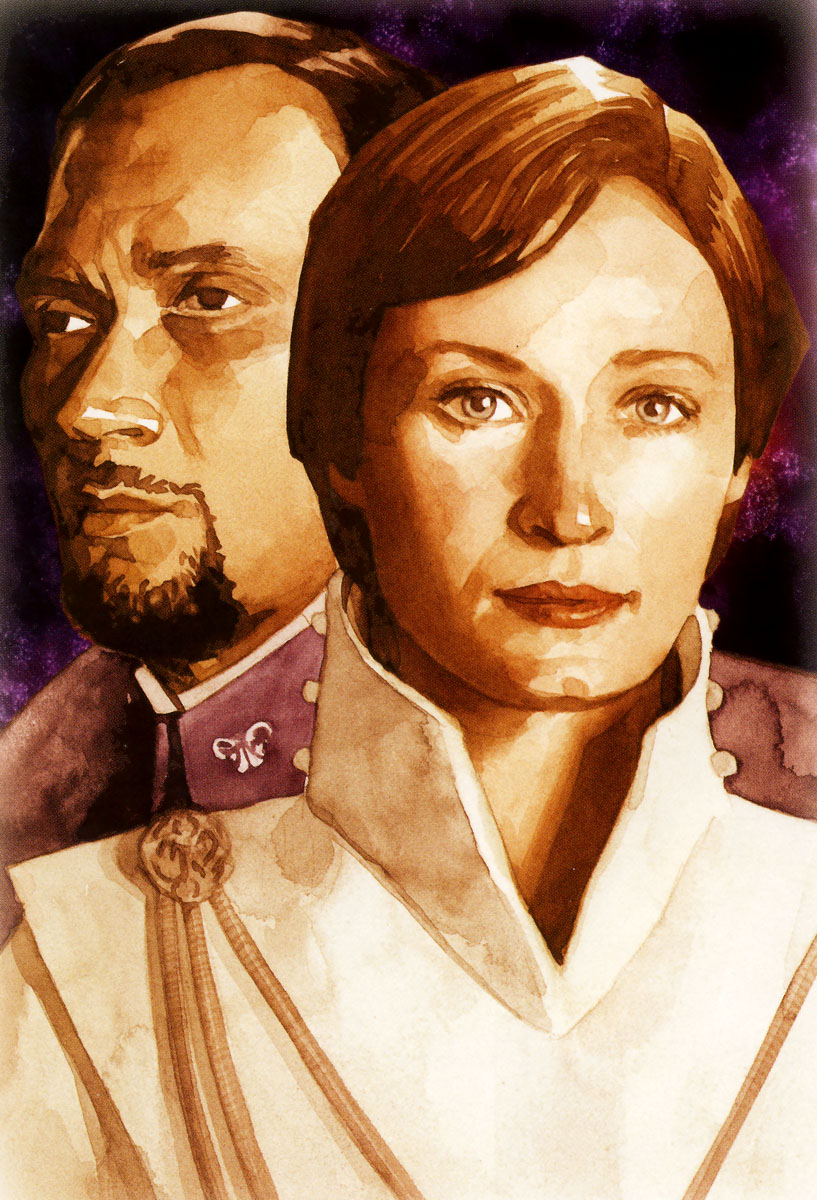
Despite widespread approval from the Senate, some factions within Republic society voiced opposition to the Security Act's passage. The Jedi Order strongly opposed the act's provisions, especially the clause calling for capital punishment for pirate forces. During the initial debates, the Jedi High Council formally advised the Senate against approving the bill, but their recommendation was promptly disregarded. One notable exception was Jedi General Anakin Skywalker, who agreed with the sentiment that the Senate was ineffective in its handling of the war.
The opposition group that initially formed to challenge the first version of the Enhanced Security and Enforcement Act consisted of three individuals: Senator Bail Organa, Senator Mon Mothma, and former Chancellor Valorum. Although Organa had initially supported Palpatine, the changes that the Republic had undergone during his leadership led him to diverge from the Chancellor's agenda. Finis Valorum's death proved to be a turning point for the Alderaanian, who decided to speak out against the act when no other senator would. Despite being labeled a traitor, Organa persisted in explaining his position and urging his fellow senators to remember their duty and the principles behind the constitution.
Organa's attempt to prevent the act's approval failed, but he and Mon Mothma resolved to continue their fight. Following the vote, they met to discuss their plans for continued opposition to Palpatine, a struggle that persisted until the final battles of the Clone Wars.
Efforts to Revoke
Mothma and Organa persisted in their struggle, attracting a significant number of supporters along the way, including Corellian Senator Garm Bel Iblis. Mothma eventually secured a seat on the Loyalist Committee alongside Organa, where they were joined by like-minded Senators Padmé Amidala of Naboo, Fang Zar of Sern Prime, Bana Breemu of Humbarine, Terr Taneel of Neelanon, and Chi Eekway Papanoida of Wroona. The Committee—originally established during the Separatist Crisis to advise the Chancellor during the tumultuous period—seemed to have become an irrelevant group of senators with little more than a symbolic title. In the later stages of the war, Palpatine's inner circle of loyal senators and bureaucrats had assumed their role as advisors. Nevertheless, the seven senators continued to attempt to influence the Chancellor's judgment in infrequent meetings concerning the course of the war and the state of the Republic.
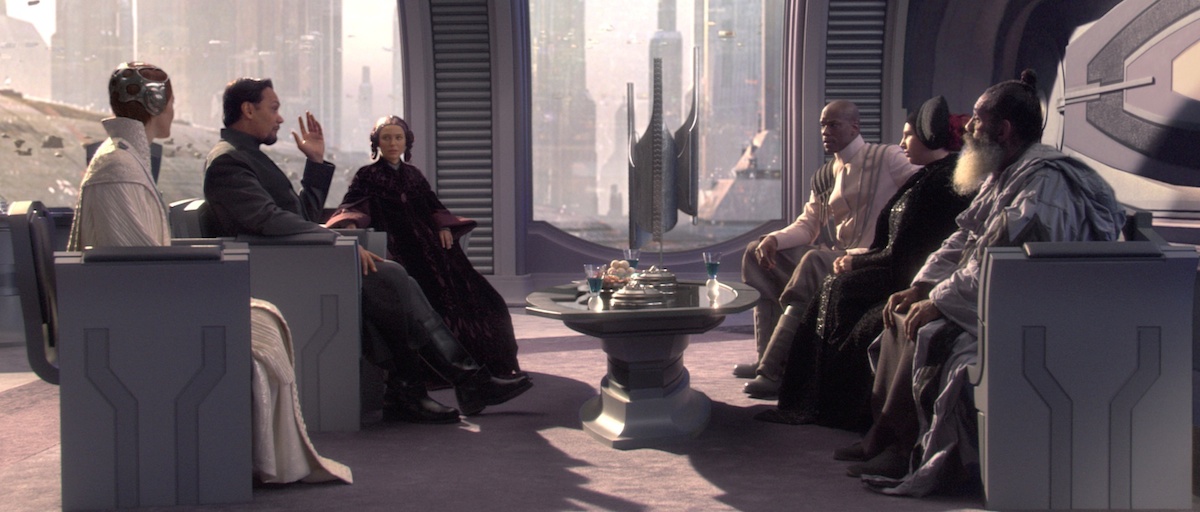
Following the siege of Cato Neimoidia and the fall of the last Confederate strongholds in the Core Worlds, Colonies, and Inner Rim, the Loyalist Committee convened to meet with the Chancellor and urge him to repeal the Enhanced Security and Enforcement Act. The committee members argued that the war was clearly turning in the Republic's favor and that the harsh measures implemented by the Security Act were no longer necessary. The Chancellor shifted the focus of the conversation to the ongoing Outer Rim Sieges before ultimately informing them that he would abide by the Senate's will if the committee's colleagues in congress also desired the act's repeal.
The vote for repeal never made it to the Senate floor. Instead, the act's powers were expanded with the 19 BBY amendment, which quickly led to the release of the Sector Governance Decree. These two events prompted Organa and Mothma to seek a more forceful approach to restore balance to the government. Together, they contacted two thousand senators and delegates to form the Delegation of 2000—a coalition of Republic dignitaries who were publicly demanding that the Chancellor relinquish his wartime powers and end the series of constitutional amendments.
Context
The Enhanced Security and Enforcement Act made its debut in the sixty-first issue of the Star Wars: Republic comic book series, entitled Dead Ends. It was conceived as an illustration of Palpatine's growing influence over the Republic, which reached its peak with his establishment of the Galactic Empire in Star Wars: Episode III Revenge of the Sith. The issue primarily centered on Bail Organa's struggle against the act's approval, as well as Finis Valorum's return to galactic politics.
The act was subsequently mentioned in several later issues of Republic, each time referred to as the "Security Act" or "Security Acts." It wasn't until the 2005 release of the novel Labyrinth of Evil that the term "Security Act" was confirmed as an alternative title for the Enhanced Security and Enforcement Act. The novel also provided details about some of the act's provisions, as well as the public's reaction to the legislation. It was also mentioned in the Episode III novelization, and received an indirect reference in the Revenge of the Sith film itself.
"The Lost One," an episode from the Star Wars: The Clone Wars television series' sixth season, depicts Valorum alive and well in 20 BBY, a year after his supposed death—which triggered the act's approval—in 21 BBY. This inconsistency was never resolved before the Expanded Universe was officially declared non-canon.